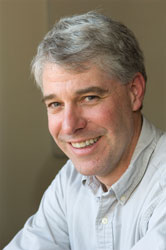Neill To Discuss Deforestation, Agriculture, and Future of the Amazon at July 3 MBL Friday Evening Lecture

MBL, Woods Hole, MA—The Amazon Basin of Brazil contains the earth’s largest tropical rainforest. Over the last two decades it has also become the world’s largest agricultural frontier. Dr. Christopher Neill, Director of the Ecosystems Center at the Marine Biological Laboratory (MBL), will discuss how new cropping systems in the Brazilian Amazon influence the regional and global environment at the next MBL Friday Evening Lecture on Thursday, July 3. Note: lecture is being held on a Thursday due to the July 4 holiday. His lecture, “Deforestation, Agriculture and the Future of the Amazon” will be held at 8:00 PM in the MBL’s Lillie Auditorium, 7 MBL Street, Woods Hole. The event is free and open to the public.

Since the 1990s, intensive cropping systems, especially for soybeans, have replaced cattle ranching as the major use of deforested lands in the Amazon Basin of Brazil, creating the world’s largest agricultural frontier. China is now the major buyer of exported Amazon soybeans. The expansion of Amazon soybean produces more food per unit land area but also alters the hydrologic cycle, greenhouse gas emissions, nutrient runoff, and stream habitats.
With colleagues from Brazil, Woods Hole, and Germany, Dr. Neill studies watersheds in soybean cropland and remaining forest on a large (3/4 size of Cape Cod) commercial soybean farm in Mato Grosso State, Brazil. He and his colleagues evaluate how cropland influences water runoff and evapotranspiration, nutrient movement to streams, and stream habitats. Dr. Neill uses this information to predict how further cropland expansion will influence regional rainfall and river flows, and how the environmental impacts of more intensive cropping could be reduced by preserving streamside forest buffers and by better fertilizer management.
Dr. Christopher Neill is a MBL Senior Scientist and Director of the Ecosystems Center. He is also the Rosenthal Director of the Brown-MBL Partnership and the Brown-MBL Graduate Program in Biological and Environmental Sciences. Dr. Neill investigates the ecological consequences of deforestation in the Brazilian Amazon, including how clearing alters runoff and the hydrologic cycle, soil fertility, emissions of carbon dioxide and other greenhouse gases from soils to the atmosphere and the water chemistry and ecological health of streams. His current research focuses on trying to understand how the rapid intensification of cropland agriculture in regions of former Amazon forest will influence soils, stream waters and the global climate, and how agricultural practices could be modified to reduce environmental impacts through fertilizer management and protection of forest buffers along streams.
Dr. Neill received a B.S. from Cornell University and a M.S. and Ph.D. from the University of Massachusetts Amherst. He was a Fulbright Scholar at the University of São Paulo in 2007 and received a Harvard University Bullard Fellowship in 2010.
Dr. Neill has a long-standing interest in communicating science to a general audience. He wrote a monthly column about Cape Cod environmental science and policy in the Falmouth Enterprise newspaper for 16 years and currently directs the Environmental section of MBL’s Science Journalism Program. He has served on the boards of Falmouth Associations Concerned with Estuaries and Salt Ponds and the Association to Preserve Cape Cod and currently serves on the board of the Buzzards Bay Coalition.
The Friday Evening Lectures are a long-standing tradition at the MBL, dating back to the turn of the last century when they were delivered by such outstanding scientists as Jacques Loeb, Thomas Hunt Morgan, and Charles O. Whitman. This year's series will continue each week June 27 through August 22. The remaining lectures in the series are below. For more information, visit mbl.edu/FEL
July 11:
Patricia Hunt, Washington State University
“Declining Human Fertility: A Conspiracy of Sex, Age, and the Environment?”
July 18:
Forbes Lecture - Joseph Fetcho, Cornell University
“Transparent Vertebrates Offer a Direct View of the Nervous System in Action”
July 25:
Porter Lecture - Richard Hynes, Massachusetts Institute of Technology; Howard Hughes Medical Institute
“The Intelligent Glue that Holds Us Together”
August 1:
Daniel Schrag, Harvard University Center for the Environment
“The Timescales of Climate Change”
August 8:
Mitchell Sogin, Marine Biological Laboratory
"Stepping on the Long Tail of Microbial Populations in Humans and the World’s Oceans"
August 15:
Carla Shatz, Stanford University
“Surprise at the Synapse: Developmental Critical Periods and Disease - Can Knowledge of One Help Cure the Other?”
August 22:
Lederberg Lecture – Susan Lindquist, Whitehead Institute for Biomedical Research; Howard Hughes Medical Institute
“From Yeast Cells to Patient Neurons: A Powerful Discovery Platform for Combating Neurodegenerative Diseases”
—###—
The Marine Biological Laboratory (MBL) is dedicated to scientific discovery and improving the human condition through research and education in biology, biomedicine, and environmental science. Founded in Woods Hole, Massachusetts, in 1888, the MBL is a private, nonprofit institution and an affiliate of the University of Chicago.